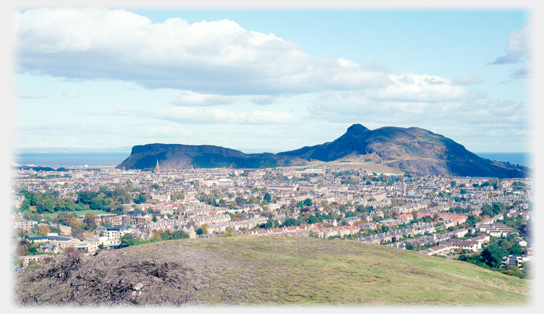
|
Edinburgh is North of London
"The part of the earth's surface where Edinburgh stands would be north of the part where London stands, even if there were no human being to know about north and south, and even if there were no minds at all in the universe." 1 In this claim Russell is asserting that whether or not there ever was, is, or will be, anyone to appreciate it, the relationship stays the same: witnessed or unwitnessed the north-ness or south-ness of the two places remains identical. In this claim is the idea that those two points, where our cities lie, are radically independent of, owe nothing at all to, human beings.
At a practical level we are pleased if things keep their place when we are not looking at them: there is utility in being able to revisit them! We can go back, confirm and stand on, these places. This gives us the correspondence theory of truth; if there is a corresponding place to stand on, then the statement about Edinburgh is held to be true. If after scouring the countryside we conclude that there is no corresponding place, we hold the statement to be false. So much is clear, what could be wrong with the idea?
Notice how we are being asked to imagine something which, at the same time, is to be something that is exactly not being imagined by anybody. Shouldn't this arouse our suspicions? A difference is being proposed between, on the one hand, thinking about something, as in the statement above, and on the other hand, the thing which is being thought about or stated. Statements, facts, thoughts are human matters. The idea is that part or the spot, in statements like Russell's, are meant to belong to that radically independent world that is strictly not human.
This independent world is often made familiar by being called the world of nature; nature who clearly lives out her life independently of humanity, and of which we are the products, and therefore cannot be the progenitors. The difficulty is that both 'parts' , and nature herself, are just as much human conceptions as Edinburgh. But worse than that, absolutely anything whatsoever we try to say about this other, supposedly independent world, is also just as much part of our, admittedly complex, human conceptual system. Russell at the time was searching for what were called Logically Proper Names 2 - words which could designate places or objects which were not part of our conceptual systems, 'here' and 'there' were sometimes offered as examples. But in the end it was seen that any term falls by the same argument. It is produced by humans for humans.
Imagine that nice patch of rock on which Edinburgh is to grow. Russell himself makes clear, the greyness of that rock, the solidness of that land, the smell of that place, the sound of our footfall on the ground, are all about sensations from the human perspective. No us: no perspective. 3 No us - no greyness, no solidness, no sound. The grey is a function of our eyes, the solidness of our size, the sound of our ears: they are relative to human beings.
What could be meant by 'that place' when it is not being imagined: a colourless, sensation-less, insubstantial nothing? And how can we be sure that something so mysterious can be part of something as human as having the relationship of 'being north of'? At a more abstract level; location, distance, and direction are human conceptions, used and imposed by us; we could not know how it is when there is no such imposition, no such conception. At an even more general level, we could include both space and time, as also being imposed by humans; now we have reached Kant's position, and the next move is to introduce noumena, but that is another page and another story.
References
- Russell, Bertrand (1912) 'The Problems of Philosophy' The Home University Library, Williams & Norgate. [(1928) Home University Library, Thornton Butterworth, London. Ch 9, p. 152]
- Russell, Bertrand (1905) "On Denoting," Mind, New Series, Vol. 14, No. 56. (Oct. 1905), pp. 479–493.
- Nagel, Thomas (1986) 'The View from Nowhere' OUP
25th May 2015 ~ 8th June 2015